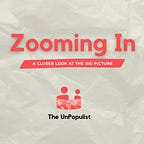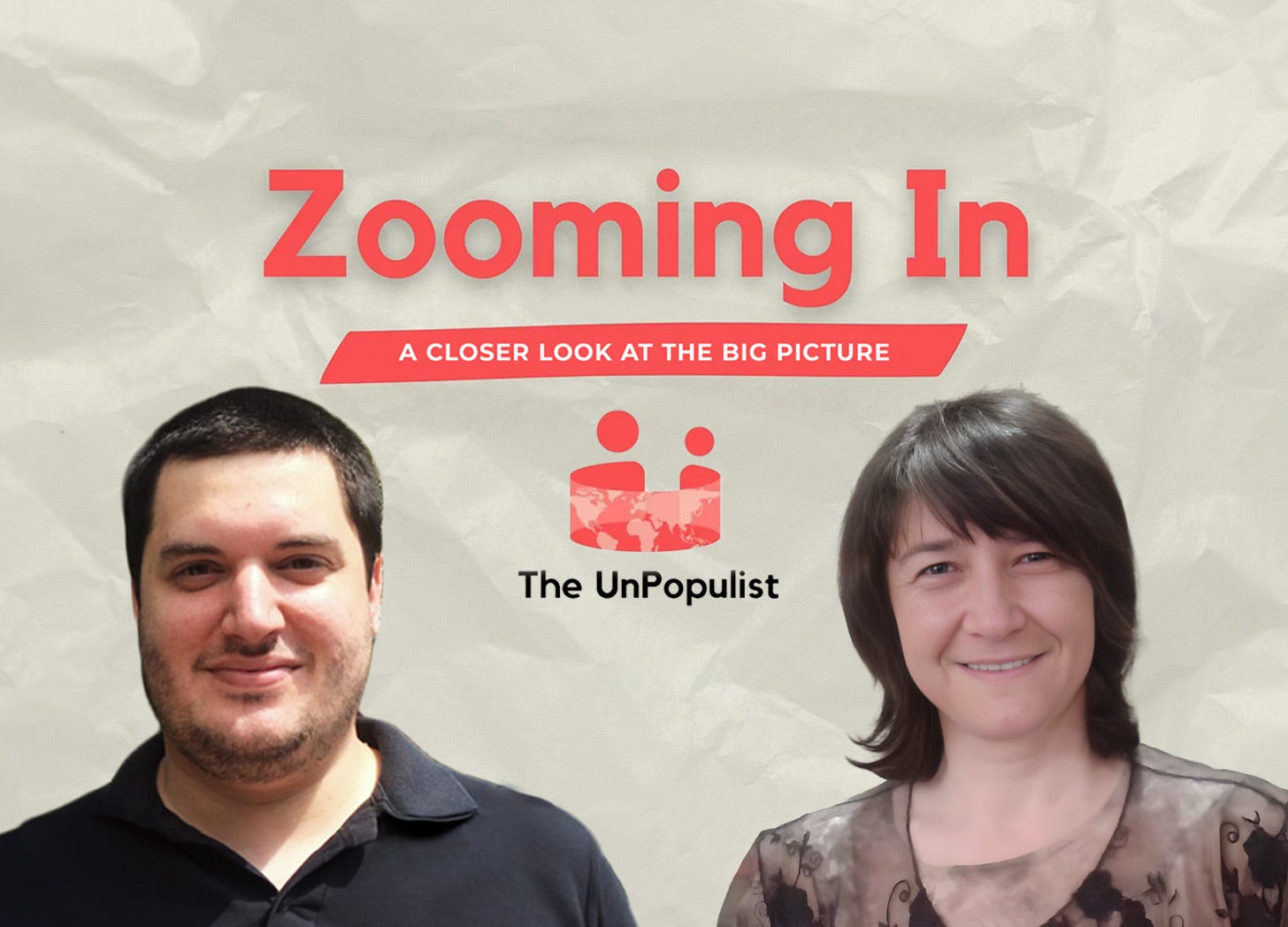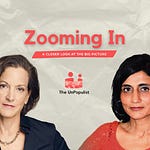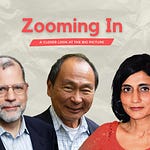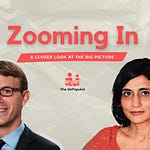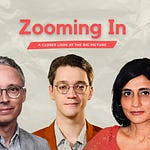Listen to Zooming In at The UnPopulist in your favorite podcast app: Apple Podcasts | Spotify | Google Podcasts | RSS | YouTube
Landry Ayres: Welcome back to Zooming In at The UnPopulist. I’m Landry Ayres.
Academia finds itself at a critical juncture, navigating internal debates over the lack of intellectual diversity and being too much in the thrall of prevailing orthodoxies, while simultaneously facing unprecedented external pressures from political forces intent on reshaping higher education. How can institutions uphold their mission of truth-seeking and open inquiry amidst such formidable challenges?
Today, senior editor Berny Belvedere sits down with distinguished journalist Cathy Young, who recently covered the Heterodox Academy’s annual conference for The Bulwark.
Together, they examine how internal criticisms of “woke” excesses and progressive orthodoxy intersect with the Trump administration’s aggressive assault on academic freedom and civil society. They explore the critical question of whether focusing on internal academic illiberalism inadvertently aligns with broader authoritarian aims, and what it means for a heterodox movement to truly champion intellectual diversity against threats from both the left and the right.
We hope you enjoy.
A transcript of today’s podcast appears below. It has been edited for flow and clarity.
Berny Belvedere: You recently attended the Heterodox Academy’s annual conference and wrote about it for The Bulwark. It’s a great piece. It not only recaps the conference, but also raises interesting questions in its own right. So it doubles as a rundown of the event while also being a springboard to explore some of the issues that conference-goers were wrestling with themselves. So let’s talk about that. What is the Heterodox Academy? What are its origins? How big is it today?
Cathy Young: It started in 2015 as the brainchild of Jonathan Haidt and as part of the pushback against, I don’t want to say “wokeness,” because it’s such a cliche, but the progressive orthodoxy in the academy that at the time was definitely seen as being ascendant. The Heterodox Academy maintained that there wasn’t enough intellectual diversity and tolerance [in academia]. So its purpose was to steer academia back toward an outlook that favored intellectual exchange, that favored truth-seeking over the pursuit of perceived social justice. That was the idea.
The challenge today is that we now find ourselves in a very different situation to 2016. It’s interesting that even then, at the inaugural conference, the question of whether the Heterodox Academy’s pushback is playing into the hands of Trumpism came up. The concern was: How do we not become a part of this backlash that is enabling a lot of racism, homophobia, and misogyny? Today, the administration is quite actively going against the universities and launching this crusade to bring them to heel and impose certain viewpoints. So, with regard to the anti-woke backlash, the question now is: Are you challenging the power structure or are you in fact aligning with the power structure? That’s the big question.
Belvedere: So I’ve worked with folks from the Heterodox Academy in the past on some writing projects. I’ve published several of their fellows when I was at Arc Digital. From the beginning, the Heterodox Academy always struck me as a more sophisticated approach to critiquing what the right broadly sees as progressivism’s excesses. And I don’t mean to say that I always, or even usually, found their pushback persuasive, but just that it was the kind of counter-argumentation, the kind of “heterodoxy,” that was refreshingly serious—especially amidst an anti-woke commentary ecosystem that more often than not seemed to churn out substance-free, panic-inducing outrage bait. And some of these critiques did land—some were well-crafted. It was at least worthy of grappling with.
Young: I think the other thing that is important to note is that the Heterodox Academy, unlike some of the other anti-woke groups, was very careful and very genuine about being nonpartisan. It wasn’t a cover for a right-wing group that has somebody like Glenn Greenwald on board and then says, “Hey, we’re inclusive. We have leftists participating as well.” No, it was genuinely nonpartisan. There are people like Alice Dreger, for instance, who is an ex-academic and journalist who is genuinely a person on the left, not just somebody who calls themselves a person on the left to agree with the Trump administration 90% of the time.
“If I was running the Heterodox Academy, I would say that, at the very least, if we’re going to do internal reform and promote worthy goals like having more diversity of opinion and more debate, let’s have a track where we specifically look at how we address the Trump administration’s impositions.” — Cathy Young
In fact, there were conservatives and Trumpists who were sniping at the Heterodox Academy from the beginning and saying, “These are just the same-old liberals who are just posturing as tolerant but in fact are not really welcoming to conservatives. They’re not really going to stand up for conservatives who are sidelined in academy. They just want more debates among liberals.” But HxA, as it is called, was definitely a more thoughtful and a more non-right-wing approach.
Belvedere: But there was a tension that I picked up on while reading your excellent write-up. A speaker at the conference, Michael S. Roth, the president of Wesleyan University, appeared to be addressing his fellow participants at the conference, as well as the attendees, when he suggested that a continued focus on “woke” excesses, amidst Trump’s assault on higher education, is seriously misguided. You quote him as saying that we’re living in a moment when:
the federal government is trying to destroy civil society by undermining the legitimacy of colleges [and] universities. We can play nice and not say that and we won’t get investigated, or we can do our job, which is to call the indecent attack on our sector indecent, wrongheaded, lawless, authoritarian, fascistic—choose your words. But if you sit there and worry about the sociology department, or whether Near East Studies is really antisemitic, I think you’re doing the work of authoritarianism.
What I found really interesting was the response. You noted that his co-panelists did not disagree with his assessment of Trump’s authoritarian attacks, which is to their credit. But they rejected the idea that they should stop focusing on the push for viewpoint diversity and fostering a culture of debate. You then reported that every conference attendee you spoke to, including attendees that you described as liberal Democrats, “strongly disagreed with Roth about the wisdom of holding back criticisms of left-wing academic orthodoxies.”
That response strikes me as a perfect encapsulation of one of the particular pitfalls that a movement that sees itself as heterodox can easily fall into. Heterodox movements are forged in the shadows of a dominant viewpoint, and they can never quite shed themselves of seeing that viewpoint as the thing to always focus on, even when that viewpoint has receded from its dominant position.
Let me be less abstract: The fact that Roth’s co-panelists gestured at the importance of calling out Trump’s authoritarianism is great, but that they also registered this deep need to keep focusing on progressivism’s excesses at a time when Trump is waging the most comprehensive assault on academic freedom that we’ve seen in ages … feels to me like that’s blinkered in precisely the ways that heterodox people usually see the dominant viewpoint, the “orthodoxy,” as blinkered. What do you think about that?
Young: I think it depends. I am more on the side of the people I was quoting that were responding to Michael Roth. I think there is a false binary in saying that you either focus only, or primarily, on the threat from the Trump administration or [that means you’re not sufficiently acknowledging the threat].
One of the people on the panel who most strongly pushed back against Roth was Sian Beilock, the president of Dartmouth, which was one of a fairly small number of schools that actually signed on to an amicus brief in Harvard’s lawsuit against the Trump administration over the funding freeze. So it’s not just, “We’re going to sit here and say, ‘Yeah, Trump is bad’ but focus our real efforts on campus orthodoxy.” I think that it’s possible to meaningfully resist what the Trump administration is trying to do while at the same time taking steps to promote intellectual diversity on campus.
And, as I point out in my piece, while it’s true that the orthodoxy associated with progressivism is receding, it’s much too early to say that it’s not a problem anymore. One example that I gave that I think is really striking is that Salman Rushdie was basically pressured into canceling an appearance at Claremont McKenna College because pro-Palestinian activists were aggravated by the fact that he had made some harsh, but I think well-deserved, comments about the degree to which a lot of people in the pro-Palestinian campus movement are sympathetic to Hamas. He didn’t say that Israel is justified in everything that it’s doing in Gaza. He didn’t say anything very extreme. He said something that was quite reasonable. And, just in terms of the symbolism, if you’re canceling Salman Rushdie, boy, are you on the wrong track.
“The challenge today is that we now find ourselves in a very different situation to 2016. It’s interesting that even then, at the inaugural conference, the question of whether the Heterodox Academy’s pushback is playing into the hands of Trumpism came up. The concern was: How do we not become a part of this backlash that is enabling a lot of racism, homophobia, and misogyny? Today, the administration is quite actively going against the universities and launching this crusade to bring them to heel and impose certain viewpoints. So, with regard to the anti-woke backlash, the question now is: Are you challenging the power structure or are you in fact aligning with the power structure?” — Cathy Young
Those attitudes still persist. There’s still this view that you’re causing “harm” if you discuss certain issues that various communities have strong feelings about. So I think that it’s important to continue promoting the idea that if you’re a university, you don’t necessarily have to include every view—I don’t think that anyone is going to say, “If you’re going to be truly heterodox, you need to incorporate the opinion that slavery was perfectly fine; I don’t think anyone is arguing for a complete free-for-all where every view should be represented on the academic level—but there does need to be an acceptance that there is a broad variety of views out there.
For instance, the question of whether the history of white supremacy in the United States means that, as a number of people claim, white supremacy is still embedded in various institutions ... that’s an open question. That is open to debate. Is it something that was basically extraneous to the core American institutions and was eventually exorcised from those institutions? Or is it something that was, as “The 1619 Project” said, part of America’s historical DNA? Those are legitimate topics of debate. Yet there’s still a kind of reluctance to consider some of those issues. So, I think that there’s still a good reason to focus on some of those things.
But it’s a question of perspective. You can debate, for instance, from what perspective the history of racism in America should be studied in history classes and to what extent contrasting views of “The 1619 Project” should be incorporated. But if you have the federal government basically coming in and saying, “Well, you can’t study those things because that’s DEI, and you’re not going to get any federal funding if you’re studying something that smacks of DEI,” then I think the focus really has to shift to the attack on academic freedom from the federal government. That’s really the upshot.
The point a lot of the people who were criticizing Michael Roth were making is that you should be able to walk and chew gum at the same time. You should be able to criticize two problems that coexist in time. But if you’re not incorporating this attack from the Trump administration into your perspective at all, and if you’re still criticizing wokeness as if it was 2021, then you are definitely missing a huge part of the picture.
Belvedere: That analogy that you just gave is apt in the sense that it’s what a lot of people use to justify focusing on both Trump and progressives as the kind of multitasking that you have to be able to do. But let me see if I can frame Roth’s perspective in an even stronger way by just shifting the metaphor a bit.
So, Roth had this line during his speech that you quoted in which he said that criticizing fellow academics in this moment is akin to saying that “the problem in Ukraine right now is that there’s corruption in the mining industry.” Some disagreed with him because ignoring corruption is never a healthy approach. That’s correct. As you put it, “Ukrainians actually spend plenty of time criticizing corruption and other internal problems precisely because these problems often risk weakening and undermining the country’s ability to resist the Russian invaders.” But I want to shift the analogy a bit.
Speaking for myself, I think a lot of heterodox types should stop focusing on “wokeness,” but that’s because I think a lot of their critiques are unpersuasive and flawed. But even if I did think that progressives and academia deserve more calling out, Roth’s argument is still a strong one because it introduces the idea of prioritization. But here’s the way I’d shift the metaphor. Instead of seeing it as Ukraine can focus both on winning the war against Russia and stamping out corruption in one of its industries, I’d introduce the idea of medical triage.
So, as Trump is waging war on universities—and I want to characterize that for a second in case people aren’t quite as familiar with what he’s doing: he’s attempting to strongarm them into adopting policies that align with MAGA ideology and threatening to withhold their funding and all sorts of other penalties if they assert agency over their own operations—for academics who care about academia’s future prospects to continue to focus on issues like why Ben Shapiro isn’t given a warm welcome when he gives a talk on campus is seriously misguided. And, again, not because ideological diversity isn’t important, but because it’s like having one doctor and then two patients who just showed up, and one’s been shot and the other twisted his ankle, and saying, “We can help both of them.” It seems noble and it seems correct—but not if the degree to which the doctor focuses on that second patient impedes his ability to meaningfully assist the first patient.
Young: I actually disagree with that metaphor because we’re really not talking about two different patients. We’re talking about one patient: academia. So I would say that it’s more like somebody coming in who is having a heart attack. Obviously, that’s what you have to focus on right now to make sure that the person survives. At the same time, if this is a person who has unhealthy habits that contributed to the heart attack, habits that will make recovery more difficult, you still need to say, “We’re going to take care of the heart attack, but you also need to look at your diet, at your sedentary lifestyle. If you smoke, you need to cut that out.” So it’s really more about a holistic approach of looking at the health of the academy in this case.
And I would argue that threats to the academy are a part of the larger pattern of, as Michael Roth said, trying to undermine civil society and attacking core liberal institutions. We’re really talking about an assault on liberal democracy in a very broad sense—especially, of course, if you incorporate the whole history of Jan. 6 into that and the way that they’re going after anyone who was involved in the Jan. 6 investigation. I mean, I can deliver this long catalog of everything that the Trump administration is doing to attack democracy. But I would say that, if you have a strong presence in academia that promotes a kind of extreme cynicism about America’s liberal democracy and tells people that it’s really just a cover for hetero-patriarchal capitalism, or that it was created as a vehicle for white supremacy ... I mean, there’s a lot of evidence that a lot of young people in particular have a pretty low level of confidence in democracy. I don’t want to say that that’s due only to “woke professors” or “the woke media.” But I think that the role of progressivism in cultivating that cynicism really should not be discounted. I think it’s something quite real.
When you’re telling people that George Washington and Thomas Jefferson were really just glorified slaveowners and the philosophers of the Enlightenment were racist and sexist and that’s basically all there is to it, I think that really does create contempt for the legacy of liberalism, which Trump is currently attacking. So I would kind of dig my heels in here and say that it really is important to maintain that legacy.
It’s complicated, of course, because if you’re going to talk about intellectual diversity, obviously intellectual diversity also has to include critiques of capitalism. You can’t say, “We’re going to have intellectual diversity, but no Marxist critiques are going to be allowed.” One of the strengths of the West is that it does have this tradition of self-critique and intellectual self-examination. But I would say that certain types of progressive viewpoints really are kind of unhelpful for pushing back against right-wing authoritarianism.
I mean, the caricatured version of this argument is that the only reason that a lot of young people in the MAGA movement are racist or a lot of guys in the Manosphere are misogynistic is because woke feminists and minorities bashing whites and males got everybody upset, and now the whites and males are pushing back by being racist and sexist. I think that’s a ridiculous argument. It’s not as if racism and sexism didn’t exist prior to the rise of wokeness. I think it’s a complicated process.
I do think the sliver of truth in this argument, though, is that some people who get annoyed with some of the more extreme woke arguments and some of the hostile rhetoric about whiteness and maleness will go looking for politically incorrect viewpoints on YouTube. And then, because they’re young and stupid, they will quickly stumble onto some of the really vile stuff. And then, because they’ve discovered that maybe some of the claims made by progressives turn out to be inaccurate, they’ll say, “They lied to us about everything. So, yeah, maybe slavery wasn’t so bad, either. And, maybe it was actually perfectly reasonable that women didn’t have the vote.”
I remember watching this young woman, who was maybe in her early 20s, give a little monologue on YouTube where she was like, “I used to be this card-carrying feminist and then I found out that some of the rape statistics were actually misrepresented. And then I went on YouTube and now my eyes have opened and I know that women were never oppressed at all.” It made me want to pull my hair out.
I don’t think that’s the main reason for the rise of right-wing ideologies, but I think it is, to some extent, a kind of recruiting tool. It’s part of this whole toxic ecosystem of extreme viewpoints, which really do exist on the right and the left. And I think there is a certain truth to the argument that once you make it okay in progressive spaces to attack people for being male, straight, cisgender, whatever, it makes it harder. It doesn’t mean that that’s the reason that racism, misogyny, and so on exist on the right. But it makes it harder to push back against those things, because you’re splintering people into these identity groups. So I think there is a very unhealthy left that makes resistance to the toxic right harder. And to that extent, I am a believer in the principle that we do need to push back against both right-wing and left-wing illiberalism. We have to defend liberalism.
In terms of where the power is coming from today, the right’s attacks are far more dangerous. We have CBS being strongarmed into essentially giving the Trump administration a massive bribe in the form of a settlement of a completely ridiculous lawsuit. That’s just one example. I know that there’s this whole argument about hard power versus soft power. And I think you can make the argument that when we’re dealing with the hard power of the Trump administration going after universities, law firms, and so on, we really don’t want to talk about the soft power of prevailing opinions in academic departments, publishing houses, media organizations, and so on. But again, groupthink is still a problem, and it makes the pushback against the Trump administration less effective.
I see a lot of people on the left, in places like Bluesky, for instance, who are still doing the purity tests, who are basically saying, “I don’t really care if you’re completely opposed to the Trump administration and extremely active and outspoken in criticizing its attacks on the universities or on the legal system. If you’ve said things about MeToo or about transgender rights that we believe are not okay, we don’t want you in our camp. We’re going to attack you and write you out of the resistance.” So I see these purity tests, and I don’t really see them so much on the heterodox side. I don’t really see anyone on that side, saying, “It’s cool that you’re also against Trump’s authoritarianism, but I disagree with your view that transgender athletes should be playing women’s sports. So, to hell with you. And I really don’t want to work with you on opposing the Trump administration’s takeover of universities.”
“We really shouldn’t underestimate the extent to which some of this genuinely toxic stuff on the left plays into the toxic stuff on the right. … I think it’s possible to argue that there is an interplay between the two without excusing some of the incredible ugliness on the right, which I think is just through the roof at the moment. And I don’t even mean just the Trump administration per se. It’s also the degree to which out and out racism and misogyny are normalized in fairly mainstream portions of the right. I mean, we have Tucker Carlson basically pushing Nazi sympathetic narratives right now like, ‘Maybe it wouldn’t have been such a bad thing if Hitler had won because at least we wouldn’t have all this wokeness and immigration.’” — Cathy Young
In the anti-Trump camp, the purity tests are on the left, not in the center. I see a lot of really bizarre hatred of centrists that I still don’t really understand. For instance, why does Matthew Yglesias provoke mouth-frothing hatred? It really mystifies me. So I think that the progressive left’s identity politics and purity tests and notions that bad ideas cause “harm” is actually itself doing lot of harm to the anti-Trump movement. And to the extent that it’s something that exists in the academy—and I think it exists in the academy probably more than it does outside it—I think it’s totally appropriate to criticize it.
Belvedere: Let me try one last question on this triage metaphor that you helped refine when you suggested that it’s not two patients but one. If a patient comes in and they’re having a heart attack, because their arteries are clogged, the doctor at that moment can focus on treating the patient for the heart attack, which is the most urgent thing, the thing that, unless the doctor helps treat, the patient will die from, or the doctor can sit the patient down at that time and say, “Let’s talk about your eating habits. Let’s see if you’re making mistakes in your diet. Can you log for me what you ate in the last week?” That doctor would be guilty of malpractice. Rather than focusing on the more urgent and dangerous thing, he’s worried about something of far less importance. That’s why I want to ask one last time about this notion of priority.
I actually have a quote from your article that I think brings this out a little bit more. So, toward the end of the piece, you quote a Heterodox Academy comms director as saying this: “If we want our universities to be seen once again as institutions committed to knowledge seeking, not ideological gatekeeping, we must embrace both forms of action, internal reform and external defense. This is not a zero sum game.” Okay, so that’s not the way I’d personally put it, but it’s a reasonable approach. But you pointed out that she went on to say that as far as the Heterodox Academy is concerned, it will continue to focus on the internal reforms as its primary focus. So, it’s just going to stick with the pushback against what it perceives to be progressive overreach in the academy as its primary concern.
But why, though? I mean, if you diagnose that that’s actually the greater threat, then that makes sense. But if you think that Trump’s attacks are the more dangerous threat, the more existential concern—and I think they absolutely, unequivocally are—then how do you justify continuing to de-emphasize Trump’s assault and focusing more on the wokeness stuff?
Young: Here’s another way to look at it. Take FIRE, the Foundation for Individual Rights and Expression. It used to be called the Foundation for Individual Rights in Education. So they’ve changed from a strictly academic focus. FIRE works with Heterodox Academy. It had displays at the conference and a couple of panels there were dominated by FIRE speakers. FIRE has definitely been very active in resisting some of the things that the Trump administration has done. It’s part of some of the lawsuits against the Trump administration, not only in academia but also in response to the attacks on the media. FIRE is probably uniquely suited to do that because it evolved as an organization that takes action, including legal action, against speech oppression. You could argue that maybe FIRE and Heterodox Academy are sort of like the cardiologist and the nutritionist. You can see the cardiologist to treat the urgent threat, but after you take action on that, you still should be going to the nutritionist to develop a better diet.
And, I mean, the heart attack metaphor is the one I used, but let’s maybe shift the focus a little bit. Because the thing about a heart attack is that if you don’t do anything about it, it’s probably going to kill you in 10 minutes. So, you don’t have a huge window of time to sit down and talk about your diet. But let’s instead say that the problem is that you have less acute problems—you have a condition that is going to kill you soon, but maybe not today. In those cases, I think it’s entirely appropriate to prescribe medications. Or, if you have heart problems that do require surgical intervention, it doesn’t necessarily need to be done today. Your doctor may look at you and say, “At some point in the next year or so, you should probably get a bypass.” But that doesn’t mean that at the same time you shouldn’t be doing things to improve your diet and maybe exercise and so on.
If I was running the Heterodox Academy, I would say that, at the very least, if we’re going to do internal reform and promote worthy goals like having more diversity of opinion and more debate, let’s have a track where we specifically look at how we address the Trump administration’s impositions. At the start of the conference, they unveiled a four-point agenda which is very good. But again, it’s looking at the internal reform whose primary focus is counteracting left-wing orthodoxy.
I also think the right-wing orthodoxy that the government is trying to impose is definitely worth looking at. There are reports, for instance, of universities taking certain material out of classes on American history, material that focuses on white supremacy and may therefore run afoul of the Trump administration’s diktat.
So I would say, while I’m defending the Heterodox Academy here, and while I still think they’re doing a lot of good things, if I was running this outfit or if I was on the advisory council, I would say, “How about in addition to this four-point agenda that we have that is primarily focused on threats from the left, let’s look at ways in which the pressure from the right may actually be already affecting college curricula.”
I would say that it does need to be a two-pronged approach against right-wing and left-wing illiberalism.
Belvedere: I do want to give credit where it’s due. So, another anecdote from the conference that you reported on involved the Heterodox Academy founder, Jonathan Haidt. In his opening day remarks, he tried to lead attendees in a chorus of, “We told you so.” And let me give my own gloss on what that is supposed to mean, just to give background. It’s basically him saying, “We, the heterodox academics, told you, the progressive academics, to reform your ways. And the fact that you didn’t do so is why you got Trump.” But you noted that many seemed uneasy with Haidt’s call-and-response gimmick. So that’s a plus.
Young: Yeah, definitely. I mean, I like Jon Haidt. But I think he got a little carried away there. It was a not-so-great moment.
Belvedere: He got into rah rah mode.
Young: I think most people agreed that it wasn’t a great moment. I mean, with one exception: Mark Bauerlein, who was part of the DeSantis takeover of New College of Florida. But yeah, pretty much everyone else was like, “Yeah, that was kind of in bad taste.”
I spoke to Nicholas H. Wolfinger at the conference, whom I think you know. We were chatting about all of that and he basically said, “Come on, do we really believe that if the universities had been a little less woke, if they had a few more conservative professors or if they had more people on the faculty who are center left rather than hard left, do we really think that Trump wouldn’t be going after them?”
Belvedere: On that very note, you had this great line in the piece where you said:
[I]t’s hard to make, with a straight face, the argument that Trump would not have embarked on his power grab vis-à-vis elite academic institutions—or that the Trumpified Republican party would have opposed such a power grab—if the average liberal faculty member had been politically closer to Jonathan Chait than to Judith Butler.
Young: Yeah, exactly. I mean, if you look at the way that the right is using the term “woke,” at this point, you’re probably woke if you’re five inches to the left of Genghis Khan. It’s just become this catch-all term. I think Amy Coney Barrett is woke at this point because she’s voted against some of the anti-immigrant stuff. The right-wing attacks on wokeness have really become a complete joke. It’s like you’re woke if you disagree with the Trump administration about anything. I mean, I’ve been called woke.
Belvedere: Well, you’re in good company. Superman is also woke.
Young: Yeah, Superman is woke. That is pretty good company.
Where it gets complicated is that while some of the reports of crazy stuff in academia are incredibly exaggerated and blown out of proportion by the right-wing ecosystem, a lot of the reports are accurate. You do have these stories of some professor being put on leave and investigated because he read in class an excerpt from Martin Luther King Jr. that contained a racial epithet. Or somebody being raked over the coals for saying that there are two biological sexes. I think it contributes to a general sense that the academy has gone kind of crazy.
Again, I think it’s incredibly exaggerated. But I will say, just as a counterpoint, that I have a couple of friends who are refugees from academia who were graduate students in extremely woke departments. You talk to them and they’ll go with the, “We told you so” stuff that Haidt was pushing at the conference.
So we really shouldn’t underestimate the extent to which some of this genuinely toxic stuff on the left plays into the toxic stuff on the right. You have to really walk a fine line. And I try to do that. But, obviously, a lot of people don’t try to be too nuanced. I think it’s possible to argue that there is an interplay between the two without excusing some of the incredible ugliness on the right, which I think is just through the roof at the moment. And I don’t even mean just the Trump administration per se. It’s also the degree to which out and out racism and misogyny are normalized in fairly mainstream portions of the right. I mean, we have Tucker Carlson basically pushing Nazi sympathetic narratives right now like, maybe it wouldn’t have been such a bad thing if Hitler had won because at least we wouldn’t have all this wokeness and immigration and so on. I’m actually not misquoting him. He’s basically said, what was the point of Churchill beating Hitler if we have an Olympic [pre]-show in Paris that has drag queens.
Belvedere: No, you’re absolutely not misquoting him. Tucker is actually bringing on that “historian” who said vile things along those lines, Darryl Cooper, to help his viewers understand the Epstein scandal. This is the same guy who had said that as far as World War II is concerned, he can’t imagine a worse outcome than what actually happened. He can’t imagine a worse outcome than the allied victory. Don’t forget, Tucker’s audience was the biggest of any cable news show around.
Young: Yeah, and [Tucker] was also very closely involved in Trump’s 2024 campaign. He spoke at the RNC. He did several interviews with Trump during his campaign stops.
Belvedere: And now he’s mainstreaming Nazis.
But to get back to the Heterodox Academy conference, I want to again make sure I credit them where it’s due. It seems like, at the conference, there were simultaneously blind spots there and also instances of a commendable willingness to self-scrutinize. I want to focus on one line from your piece where you contrasted two different models of the idea of heterodoxy. You said that one is “heterodoxy as it should be and not heterodoxy as code for ‘anti-woke.’” What’s heterodoxy in its proper form, in your view?
Young: Right. Well, heterodoxy, by definition, is the opposite of orthodoxy, right? So heterodoxy is a commitment to a diversity of viewpoints. That doesn’t mean that to be properly heterodox, you have to be willing to debate the virtues of pedophilia or the historical merits of slavery. Obviously not. But for the sake of intellectual diversity, I really do think that you should strive for the Overton window to be as wide as possible.
“Heterodoxy, by definition, is the opposite of orthodoxy, right? … [That’s] heterodoxy as it should be and not heterodoxy as code for ‘anti-woke.’ … Heterodoxy is a commitment to a diversity of viewpoints. That doesn’t mean that to be properly heterodox, you have to be willing to debate the virtues of pedophilia or the historical merits of slavery. Obviously not.” — Cathy Young
As somebody who is pro-choice, I would say that anti-abortion or pro-life viewpoints should definitely be a part of the permitted discourse within the academy. There’s a wide range of viewpoints that I personally disagree with that should be a part of the discourse. As much as I loathe the idea that NATO expansion was to blame for Putin’s attack on Ukraine, does that mean that I want to cancel John Mearsheimer? I think that he should be vigorously argued with, but he certainly should be able to make his argument without suffering retaliation. So yeah, the good version of heterodoxy is having a wide range of debate and, unless you’re talking about essential aspects of human rights, everything else should be up for grabs. “Is genocide good?” Obviously that’s not up for grabs. “Is it okay to use terrorism to promote your political agenda?” Obviously not up for grabs. But other than these very obvious exceptions, I think there should be a very broad range of viewpoints.
I would also say that, without turning it into an orthodoxy, I do think that academia in liberal democracies should have the worth of liberal democracy as its default position. It should be presenting that as the default viewpoint to students. That doesn’t mean that you don’t have a course in which you examine the ideas of monarchists—as long as you’re not reading a lot of Curtis Yarvin, which would just be a waste of time. But people in political science classes, for instance, should seriously contend with reactionary thought in the 19th century, in the wake of the French Revolution. In the same way, it’s perfectly fine to study far-left critics of liberal society. But our starting point should be the goodness and the worth of liberal democracy.
I also think that heterodoxy should also be about not allowing ideology to take precedence over facts. The search for facts really should be essential. I’ll give you an example. One of the more left-leaning speakers at the Heterodox Academy conference was giving an example from the Trump administration’s attempt to stamp out DEI and say that you cannot have courses that promote DEI-based ideas. And the speaker basically said, “If you’re looking at various issues in medical science, there are actual health disparities between various population groups in the United States. African Americans, for instance, really do have many disadvantages in healthcare. And it’s definitely worth looking at ways in which racial and social disparities contribute to some of these medical disparities. And perhaps at the ways in which racial prejudices among some health professionals, not necessarily overt racism, but certain assumptions that may be made about Black people, for instance, may contribute to inadequate healthcare. And we don’t want to say, as a matter of science, you cannot look at the possibility that racial inequities may contribute to some of this because that’s wokeness.” I totally agree with that. That’s a completely valid viewpoint.
The other side of that is that, in many cases, these questions start with the assumption that disparities are due to racial inequity and don’t look at other things that may have a historical root in racial inequity but don’t necessarily reflect actually existing racial prejudices here and now. So if you’re going to look at those issues, you really do have to look dispassionately at the facts wherever they take you. You can’t start with the assumption that racism or sexism is at the bottom of this. Do you remember when the term “mansplaining” was fashionable? There were these claims that women in the workplace are held back by being interrupted and talked down to. And there were some studies that people were citing. It turns out that if you reanalyze those studies, women do get interrupted more than men, but they’re primarily interrupted by other women.
“You should be able to walk and chew gum at the same time. You should be able to criticize two problems that coexist in time. But if you’re not incorporating this attack from the Trump administration into your perspective at all, and if you’re still criticizing wokeness as if it was 2021, then you are definitely missing a huge part of the picture.” — Cathy Young
If you’re in academia and you’re going to look at issues that may have a relation to social justice, you really do have to look at those facts wherever the facts take you.
Belvedere: But the important point here is that, if someone comes out with research and then another researcher finds a methodological flaw or finds that their explanation isn’t good, they can publish that and that’s how we refine our body of knowledge. What we don’t want is the government’s thumb on the scale. We don’t want the government saying, “This is what you can talk about. And then this is what will get you in trouble with us.” That creates pressure to stay away from certain subjects.
Young: Yeah, definitely. And: “This is what is going to get your funding cut.”
Belvedere: Exactly. Campus Reform had highlighted, as one of their news items, that a university is offering a course on the Black experience and it’s using Kendrick Lamar lyrics to analyze it. And Campus Reform was treating it as if it should be a cause for alarm, as opposed to something that, if you want to take it, you can, and if you don’t want to take it, you don’t have to, but not something that the government needs to look into. So we’re definitely in agreement that there should be a flourishing of viewpoints and that scholarly pursuits shouldn’t be inhibited by the government.
Young: Right. I do think that you have to very clearly take a stand that you’re not inviting the government to come in and put its thumb on the scale.
© The UnPopulist, 2025
Follow us on Bluesky, Threads, YouTube, TikTok, Facebook, Instagram, and X.
We welcome your reactions and replies. Please adhere to our comments policy.


